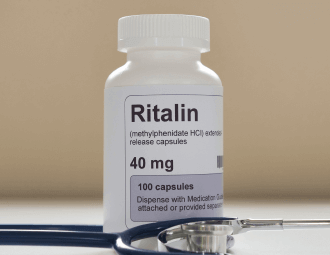Highlights
- Intuniv is a non-stimulant medication approved for children and adolescents with ADHD but also used off-label for adults.
- Being a non-stimulant, it is used as the second choice of treatment. Your healthcare provider may prescribe you Intuniv if stimulant medications aren’t working for you or if you are looking for a medication with fewer side effects.
- Intuniv can cause some unwanted side effects, like any other medicine. These include dizziness, drowsiness, or lightheadedness.
- While taking Intuniv, it’s essential to be mindful of other medications you are taking. Some medicines can interact with it.
For people with ADHD, it is often challenging to have a calm mind and sharp focus, and self-help tips and psychotherapy are not always helpful enough. If the symptoms persist and affect daily life, a healthcare provider may prescribe medication.
Then, another challenge may occur: not everyone tolerates stimulants well, even though they are the first-line treatment. Guanfacine (brand name Intuniv) is one of the non-stimulant options that can help in this case. Let’s take a closer look at its features.
What Is Intuniv (Guanfacine)?
Intuniv (guanfacine) is an
Intuniv (guanfacine) acts on the
When Is Guanfacine Prescribed for ADHD?
Being a second-line treatment, Intuniv (guanfacine) is mostly used when other ADHD medications (such as stimulants) aren’t effective. It’s a reliable option in case of the following situations:
- When stimulants aren’t working.
- If you have co-occurring anxiety and stress.
- If it is hard for you to keep up with the fluctuating emotions.
- If sleep issues exhaust you.
- If other issues like substance abuse are tagging along with ADHD.
Learn more: Medications for Adults With ADHD and Anxiety
How Does Guanfacine Help With ADHD?
Guanfacine extended-release tablets, which were first
Intuniv affects specific chemicals in the brain to help you stay focused and concentrate. This is involved in the regulation of attention and control of impulses, improving the way you deal with logical and reasoning questions.
This medication can also help with other ADHD symptoms like hyperarousal, social aggression, rejection sensitivity, and emotional sensitivity. In contrast to stimulants, Intuniv decreases the adrenaline levels in the brain and helps you manage the symptoms that may not be treated as effectively with stimulants.

About the Dosage
Intuniv tablets usually come in extended-release form, which means they release slowly into your system. The typical starting dose of these tablets is 1 mg, which with time and need, can be increased to 3 mg or 4 mg at maximum. The right dose for anyone is only recommended by a healthcare provider based on several factors, so patients must not alter it without a consultation.
Typical dosages are provided for informational purposes only. Please consult your healthcare provider and follow their instructions.
The Best Time of Day to Take Guanfacine for ADHD
Guanfacine extended-release tablets—that are typically prescribed for ADHD—usually don’t have strict requirements on the time they should be taken. However, it is important to take guanfacine at the same time each day to ensure consistent concentration. Note that it’s better to avoid fatty meals and grapefruit juice while taking Intuniv because they can increase absorption of this medication and therefore increase its levels in the body, which may contribute to side effects and your overall response to medication.
When it comes to guanfacine IR, it is usually recommended to be taken in the evening.
Note that individual response to this medication varies. Some patients have trouble sleeping when they take guanfacine in the evening; others can’t deal with drowsiness when they take it in the morning. It’s best to monitor your response to guanfacine to choose the most appropriate time and consult with your healthcare provider if you find it difficult.
Storage and Disposal of This Medication
For safe and responsible use, medications must be stored and thrown away correctly. Remember to keep Intuniv (guanfacine) in the bottle it came in. It should be closed tightly to protect from moisture. If you have children or pets, keep it away from their reach.
If your medication has expired or your doctor recommends changing it, use a drug-pack program to dispose of it properly or bring it to the pharmacy. You can also get advice from your pharmacist or a healthcare provider regarding the disposal of your medication.
What Should I Do If I Miss a Dose?
If you forget to take Intuniv, don’t stress. If you realize it within a few hours, take the missed dose as soon as you can. But if the time for the next dose is near, don’t double up—just stick to your schedule by continuing with the next routine dose. In case you forget to take your medicine frequently, consult your healthcare provider on possible solutions.
Side Effects of Intuniv (Guanfacine)
While Intuniv is a helpful solution for many, it can cause some unwanted side effects like any other medication.
Common Side Effects
- Feeling a bit sleepy (drowsiness)
- Mild or moderate headache
- Feeling a bit sluggish (fatigue)
- Dry mouth
- Slowed digestion which can cause constipation
Less Common Side Effects
- Nausea or vomiting
- Lightheadedness or dizziness
- Stomach upset or pain
- Anxiety or nervousness
In rare occurrences, Intuniv may cause allergic reactions or
Withdrawal Symptoms
Stopping Intiniv abruptly can lead to withdrawal symptoms. If you have been taking Intuniv for quite a long time, your body has gotten used to it, and now it needs to learn to function without it again. So, you may experience withdrawal symptoms like:
- Anxiety
- Agitation
- Tremors
- Headaches
If you are thinking of stopping or reducing Intuniv, talk to your doctor to learn if it is necessary and how to do it correctly. They will help you come up with a plan to minimize withdrawal symptoms.
Drug Interactions
If you are taking other medications while on Intuniv, it’s important to inform your healthcare provider about it. Taking different medications for different conditions is sometimes necessary, and they need to work in harmony, but sometimes they can clash.
Here are some medications that may not get along with Intuniv and cause adverse reactions:
- Antihypertensive medications: Taking Intuniv along with other blood pressure medications can drop your blood pressure too low.
- Central nervous system depressants: Taking guanfacine and tranquilizers together can make you more sleepy or stop your breathing.
- CYP3A4 inhibitors: Protease inhibitors, antifungals, or antibiotics can increase Intuniv’s level in your body and lead to
negative effects[5] . - Tricyclic antidepressants: The combined use of TCAs and guanfacine may lead to low blood pressure.
To be on the safer side, always discuss the medications you are taking with your healthcare provider and remember to notify them about any supplements, vitamins, and over-the-counter medicines. They may also have the potential to interact with Intuniv.
Risks and Considerations
Even though guanfacine is generally well-tolerated, there are a few risks that you should be aware of:
- When Intuniv is first started or when its dose is increased one may feel dizzy or light-headed and potentially pass out. Potential long-term effects include heart issues.
- When taking Intuniv, you will need to check your heart rate. It is especially important if you take other medications that affect your heart rate because Intuniv can make it go down.
- You may become drowsy or less alert, which makes driving and operating machinery more dangerous.
- For those with a history of mental health conditions like
depression[6] , guanfacine has an increased potential to make symptoms worse. Remember to discuss this with your healthcare provider.
Precautions
Below are some precautions you need to keep in mind before taking guanfacine medication:
- Inform your doctor if you have ever been allergic to a medicine or if you know you are allergic to something.
- Notify your healthcare provider of all the other medications or supplements you take to avoid drug interactions.
- If you have other medical conditions, be sure to inform your doctor.
- Tell your doctor if you are pregnant, breastfeeding, or planning to get pregnant.
To Summarize: Is Guanfacine Effective?
Mostly, the first choice for ADHD treatment includes stimulant medications such as Ritalin or Adderall. However, if you are not responding to stimulants or you are looking for an option with fewer side effects, non-stimulants like guanfacine may be more suitable. It has been proven effective for ADHD treatment even though for adults with this disorder it is prescribed off-label.
Book an online appointment with one of our medical professionals today to learn which ADHD treatment approach can help you best.
FAQ
How does guanfacine make you feel?
As a non-stimulant, guanfacine can make you feel less impulsive, and also its antihypertensive nature promotes calmness and relaxation.
How long does it take for guanfacine to work for ADHD?
Since guanfacine is not a stimulant medication, it may take time to experience its full effects. The initial improvement may be noticeable in 2-4 weeks but significant effects may take 2 to 4 months. If you have any questions about the effectiveness of the chosen treatment, please discuss them with your healthcare provider.
Does guanfacine increase focus?
Yes, its mood-stabilizing ability and antidepressive properties improve focus and decrease impulsiveness.
How effective is guanfacine for ADHD?
Guanfacine has shown positive effects on ADHD symptoms in children and adults. Although it is a second-line treatment, it can be helpful for those who can’t take stimulants for ADHD.
What are the benefits of Intuniv?
Intuniv can reduce impulsiveness, improve focus and concentration, and positively affect sleep. It also works as a mood stabilizer.
Is guanfacine the same thing as Adderall?
They are completely different medications in terms of their mechanisms of action and other features. Adderall is a stimulant while guanfacine works as a non-stimulant.
- Non-stimulants are slower in onset compared to stimulants and last longer.
- Non-stimulants are less likely to be abused while stimulants have a higher risk of misuse.
- Non-stimulants like guanfacine have antihypertensive and antidepressant effects besides treating ADHD, while Adderall is more targeted.
- Side effects of non-stimulants are usually tolerated better than those of stimulants.
It is important to have a detailed consultation with your healthcare provider to learn what medication can be more suitable in your case.












